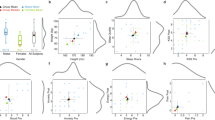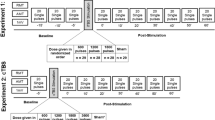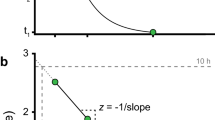Abstract
FOR some time it has been suspected that the most relevant parameter when using electric shock as a stimulus is the applied wattage. Forbes and Bernstein1, Gilmer2, Hill et al.3, Campbell and Teghtsoonian4, Green5, all found evidence to support this contention. Although constant current and constant voltage outputs have long been in use, a device capable of supplying a constant power output compensating for the changes in impedance found in any biological circuit has not hitherto been available.
This is a preview of subscription content, access via your institution
Access options
Subscribe to this journal
Receive 51 print issues and online access
$199.00 per year
only $3.90 per issue
Buy this article
- Purchase on Springer Link
- Instant access to full article PDF
Prices may be subject to local taxes which are calculated during checkout
Similar content being viewed by others
References
Forbes, T. W., and Bernstein, A. L., J. Gen. Psychol., 12, 436 (1935).
Gilmer, B. V. H., Amer. J. Psychol., 48, 444 (1937).
Hill, H. E., et al., J. Clin. Invest., 31, 464 (1952).
Campbell, B. A., and Teghtsoonian, R., J. Comp. Physiol. Psychol., 51, 185 (1958).
Green, R. T., Animal Behaviour, 6, 72 (1958).
Author information
Authors and Affiliations
Rights and permissions
About this article
Cite this article
GREEN, R. Absolute Threshold for Electric Shock. Nature 194, 1303–1304 (1962). https://doi.org/10.1038/1941303a0
Issue Date:
DOI: https://doi.org/10.1038/1941303a0
This article is cited by
-
Electrical stimulation of sensory nerves with skin electrodes for research, diagnosis, communication and behavioral conditioning: A survey
Medical & Biological Engineering (1968)
-
Parameters of Electric Shock relevant to Electro-convulsion Therapy
Nature (1963)
Comments
By submitting a comment you agree to abide by our Terms and Community Guidelines. If you find something abusive or that does not comply with our terms or guidelines please flag it as inappropriate.



